Business as Usual Means . . ., September 19, 2023
 It is becoming increasingly difficult to watch the evening news. The earthquake in Morocco was a horrendous natural disaster. The devastating flood in Libya caused by Medicane Daniel has claimed perhaps more than 20,000 lives. Wildfires in Canada, Greece, and Algeria. Evacuations from severe tropical storms in California, Hong Kong, and Madagascar. Prolonged drought in Africa. Floods in Pakistan, France, and the UK. Coups all over the world. Armed conflict in too many places to keep track. And the continuing war in Ukraine, now with cluster bombs and depleted uranium from the United States!
It is becoming increasingly difficult to watch the evening news. The earthquake in Morocco was a horrendous natural disaster. The devastating flood in Libya caused by Medicane Daniel has claimed perhaps more than 20,000 lives. Wildfires in Canada, Greece, and Algeria. Evacuations from severe tropical storms in California, Hong Kong, and Madagascar. Prolonged drought in Africa. Floods in Pakistan, France, and the UK. Coups all over the world. Armed conflict in too many places to keep track. And the continuing war in Ukraine, now with cluster bombs and depleted uranium from the United States!
 July 2023 was the hottest month since 1880 when the world began keeping records. We have not been as harshly affected as many places in the world, but there were many days of stifling hot air and soaring temperatures, as Tracy and Bonnie, who were visiting at the time, can attest. (They were extremely grateful to be staying in the air-conditioned hotel 60 seconds away {$10 a night!}.) The neighborhood birds and monkeys depended on our birdbaths on those hot and dry days. Now, despite predictions of continued drought, we're experiencing low temperatures, heavy rain, and strong winds. It's clear that, everywhere, the weather patterns have beomce extreme, and the predictable seasons of the past are no more.
July 2023 was the hottest month since 1880 when the world began keeping records. We have not been as harshly affected as many places in the world, but there were many days of stifling hot air and soaring temperatures, as Tracy and Bonnie, who were visiting at the time, can attest. (They were extremely grateful to be staying in the air-conditioned hotel 60 seconds away {$10 a night!}.) The neighborhood birds and monkeys depended on our birdbaths on those hot and dry days. Now, despite predictions of continued drought, we're experiencing low temperatures, heavy rain, and strong winds. It's clear that, everywhere, the weather patterns have beomce extreme, and the predictable seasons of the past are no more.
 We are grateful to wake up each morning with the world still here. We find ourselves much more frequently practicing death meditation and expecting the world to end at any moment. Along with the reports of perpetual war, there are threats to resort to nuclear weapons, nuclear power plants in war zones, shifting alliances, missile tests, and volatile power blocs. Add that to shifting ocean currents, mutating viruses, the melting permafrost, the proliferation of plastic pollution, and the ever-increasing release of greenhouse gases, and it spells D-I-S-A-S-T-E-R!
We are grateful to wake up each morning with the world still here. We find ourselves much more frequently practicing death meditation and expecting the world to end at any moment. Along with the reports of perpetual war, there are threats to resort to nuclear weapons, nuclear power plants in war zones, shifting alliances, missile tests, and volatile power blocs. Add that to shifting ocean currents, mutating viruses, the melting permafrost, the proliferation of plastic pollution, and the ever-increasing release of greenhouse gases, and it spells D-I-S-A-S-T-E-R!
 Sixty millions years ago, the dinosaurs never knew what hit them. They were not aware of the asteroid, and, even if they had been, they could not have prevented its impact. On the other hand, we certainly know what is happening. We are causing it. If everyone were to acknowledge the danger and cooperate to modify it, we might be able to avoid doom. It's up to us, but you can be sure that there will always be idiots denying it with their last breath on Faux News!
Sixty millions years ago, the dinosaurs never knew what hit them. They were not aware of the asteroid, and, even if they had been, they could not have prevented its impact. On the other hand, we certainly know what is happening. We are causing it. If everyone were to acknowledge the danger and cooperate to modify it, we might be able to avoid doom. It's up to us, but you can be sure that there will always be idiots denying it with their last breath on Faux News!
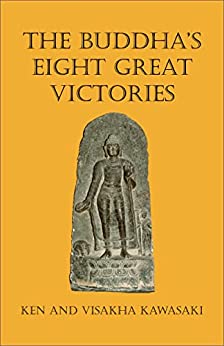 In the Buddhist English class we are currently teaching via ZOOM, we began by reading The Buddha's Eight Great Victories, with its emphasis on non-violent solutions to conflict. Most recently we have read two Jataka tales, "Not One Drop of Blood" (Maha-Silava Jataka) and "Prince Temiya" (Mugapakkha Jataka), and these stories have generated discussion of some of the major perils facing the world today.
In the Buddhist English class we are currently teaching via ZOOM, we began by reading The Buddha's Eight Great Victories, with its emphasis on non-violent solutions to conflict. Most recently we have read two Jataka tales, "Not One Drop of Blood" (Maha-Silava Jataka) and "Prince Temiya" (Mugapakkha Jataka), and these stories have generated discussion of some of the major perils facing the world today.
Foremost is the issue of war. There are, at present, more than 600 wars raging throughout the world. For humans, who flatter themselves on being civilized, this is unconscionable. Some are a legacy of colonialism, which, by itself, was a blight on human history. All are profitable for somebody. All are caused by men who claim that they have reason, justice, and God on their side. We've referred to Ven. Bhikkhu Bodhi's essay, "War and Peace: A Buddhist Perspective" (Inquiring Mind, 2014), in which he maintains that World War II was a just war, necessary for the defeat of Fascism. That essay spawned a debate between him and Ven. Thanissaro, which is still available online. Two additional essays explaining Ven. Thanissaro's views on this subject, are "Getting the Message" (2010) and "At War With the Dhamma" (2022). We also shared a scholarly analysis of why some Buddhists justify war, "Buddhism and War: A Study of the Status of Violence in Early Buddhism," by James A. Stroble (1991), with the class.
In previous reports, we have several times referred to Erica Chenoweth and her research into nonviolence. She has shown statistically that in modern times, nonviolent movements have succeeded far more often than violence in producing meaningful change. Nonviolence can and must take many forms; each tactic must be designed and carried out to respond to the particular problem or situation. The goal is usually peace, harmony, positive change, and understanding on the part of the opponent, whereas the goal of violent action is to weaken and defeat the opponent. Unfortunately, responding with violence is easy, but usually destructive, but nonviolence takes careful thinking, finding a strategy, detailed planning, and patience. ("Mahosadha's Incomparable Ingenuity" (Maha-Unmagga Jataka), presents examples of various strategies of nonviolence. The story encourages us to examine each case of conflict, think creatively, work collectively and cooperatively, in order to devise and carry out a suitable solution. This is a much more fruitful avenue for meaningful change than violence can ever be. Obviously, if we manufacture weapons and make battle plans, we'll never imagine any other strategies, let alone try to implement them.
|
INTERNATIONAL PEACE DAY
SEPTEMBER 21, 2023 |
|||||
| War is not Inevitable, and Social Scientists are Finding Peace Movements more Effective | |||||
| by H. Patricia Hynes, September 13, 2023 | |||||
 |
|||||
| Photo: The Boston Globe | |||||
| On International Peace Day this September 21, imagine an unstoppable wave of peace actions sweeping across our country, like that of the first Earth Day, April 22, 1970. That day Congress closed so its members could attend environmental teach-ins; 20 million citizens and politicians (1/5 of the population) came out for marches, rallies, and concerts; and 10 million children participated in peace teach-ins in their schools. A surge of environmental legislation and the creation of the US EPA by President Nixon followed in the next year. May we be part of finding our country's lost path to peace: by peace education and active bystander programs in every school; by interracial and interfaith collaborations; by reparations for the historical injustices of slavery and theft of land from Native Americans; by ensuring women's full equality, including restoring women's reproductive rights; by beating warheads into windmills through shifting our government's priorities from militarism to renewable technologies; and by demanding that our lawmakers have a real democratic debate on war, peace, and the military budget. |
|||||
| https://znetwork.org/znetarticle/war-is-not-inevitable-and-social-scientists-are-finding-peace-movements-more-effective/ | |||||
 As Ven. Thanissaro points out, if a Buddhist undertakes the First Precept, not to kill, it has to be an absolute. His teaching to a soldier was unequivocal. Being killed in a battle, while intending to kill an enemy will result in rebirth in one of the woeful states, hell or as an animal. This must also be true for one who kills an enemy. Furthermore, if this true for a soldier, it must also be true for a ruler or leader who gives the order to kill. Prince Temiya understood this completely, and, in order to escape becoming king, he endured sixteen years pretending to be mute, deaf, and insensitive to any stimulus whatsoever. He realized that being a king entailed Wrong Livelihood, in both engaging in war and imposing capital punishment.
As Ven. Thanissaro points out, if a Buddhist undertakes the First Precept, not to kill, it has to be an absolute. His teaching to a soldier was unequivocal. Being killed in a battle, while intending to kill an enemy will result in rebirth in one of the woeful states, hell or as an animal. This must also be true for one who kills an enemy. Furthermore, if this true for a soldier, it must also be true for a ruler or leader who gives the order to kill. Prince Temiya understood this completely, and, in order to escape becoming king, he endured sixteen years pretending to be mute, deaf, and insensitive to any stimulus whatsoever. He realized that being a king entailed Wrong Livelihood, in both engaging in war and imposing capital punishment.
 Wrong Livelihood in the Eightfold Path is identified as trade in weapons, trade in human beings, trade in meat, trade in intoxicants, and trade in poison. In the case cited above of the soldier, we can see that business in weapons clearly includes their use when the intention is to kill. By extension, this would have to include the making of weapons, which means that anyone involved in the arms industry, both the manufacture and the trade, is practicing Wrong Livelihood. If we define poison as any substance which harms sentient beings, we can include pesticides, and fossil fuels which are poisoning not only the air with pollution and greenhouse gases, but also the water and earth itself (e.g., oil spills and strip mining). This reminds us again of Prince Temiya, who proclaimed, "After sitting and resting beneath a tree, enjoying its shade and shelter, I would never harm even a small twig of that tree."
Wrong Livelihood in the Eightfold Path is identified as trade in weapons, trade in human beings, trade in meat, trade in intoxicants, and trade in poison. In the case cited above of the soldier, we can see that business in weapons clearly includes their use when the intention is to kill. By extension, this would have to include the making of weapons, which means that anyone involved in the arms industry, both the manufacture and the trade, is practicing Wrong Livelihood. If we define poison as any substance which harms sentient beings, we can include pesticides, and fossil fuels which are poisoning not only the air with pollution and greenhouse gases, but also the water and earth itself (e.g., oil spills and strip mining). This reminds us again of Prince Temiya, who proclaimed, "After sitting and resting beneath a tree, enjoying its shade and shelter, I would never harm even a small twig of that tree."
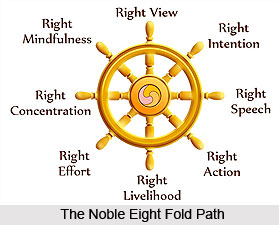 Taken in this sense, Right Livelihood meshes neatly with two other steps of the Eightfold Path, namely, Right Intention and Right Action. Right Livelihood must include all aspects of non-harming. Being a scientist or a teacher should be a noble endeavor. When, however, a scientist or an engineer engages in research to create weapons of mass destruction, his livelihood loses its nobility. When a teacher promotes ignorance and encourages his student to hate, rather than inspiring critical thinking, tolerance, and empathy, he has denigrated his profession. If a religious leader preaches hatred and racism leading to injustice, violence, or even genocide, he is guilty of great sin and a shame to his vocation. When an environmental official advocates the destruction of forests, instead of their protection, he can no longer claim Right Livelihood. Let us remember Joseph Rotblat, the scientist who withdrew from the Manhattan Project on moral grounds and was awarded the Nobel Peace Prize in 1995. The ideal for everyone should be non-harming. How much of business and industry involves damaging or destroying not only wildlife, the natural environment, but also the well-being of individuals, and societies throughout the world? Factory farming, monoculture, genetic modification, pesticides, worker exploitation, child labor, and the list goes on and on! Furthermore, what are the sources of water, air, and soil pollution? Who is responsible for pollution from plastic, noise, and light?
Taken in this sense, Right Livelihood meshes neatly with two other steps of the Eightfold Path, namely, Right Intention and Right Action. Right Livelihood must include all aspects of non-harming. Being a scientist or a teacher should be a noble endeavor. When, however, a scientist or an engineer engages in research to create weapons of mass destruction, his livelihood loses its nobility. When a teacher promotes ignorance and encourages his student to hate, rather than inspiring critical thinking, tolerance, and empathy, he has denigrated his profession. If a religious leader preaches hatred and racism leading to injustice, violence, or even genocide, he is guilty of great sin and a shame to his vocation. When an environmental official advocates the destruction of forests, instead of their protection, he can no longer claim Right Livelihood. Let us remember Joseph Rotblat, the scientist who withdrew from the Manhattan Project on moral grounds and was awarded the Nobel Peace Prize in 1995. The ideal for everyone should be non-harming. How much of business and industry involves damaging or destroying not only wildlife, the natural environment, but also the well-being of individuals, and societies throughout the world? Factory farming, monoculture, genetic modification, pesticides, worker exploitation, child labor, and the list goes on and on! Furthermore, what are the sources of water, air, and soil pollution? Who is responsible for pollution from plastic, noise, and light?
Shouldn't we wonder how life on this planet will end? Will it be global warming, climate catastrophe, pollution, a pandemic, a nuclear accident, another asteroid, or nuclear warfare? Whatever it may be, let us remember Pete Seeger's profound question, "When will we ever learn?"
Although the song, "Where Have All the Flowers Gone?," refers specifically to war, the question can equally be asked about environmental disaster. Have we learned nothing from the Dust Bowl of the thirties? Factory farming, urban sprawl, logging, pipelines, oil leaks and spills, air and water contamination, threaten even greater disaster. It has been discovered that the Earth has lost half of its wildlife in the last 40 years, and the pace of species extinction is increasing with pollution and the destruction of habitats. All environmentalists know that the health of the planet depends on biodiversity. Each extinction is a potential threat. In a village in China, aged farmers are climbing the trees to pollinate pear blossoms by hand, because the bees have disappeared. Let us also not forget the multiple disasters wrought by Mao Ze Dong's Great Leap Forward.
In "Prince Temiya Jataka," As part of the explanation of why he does not want to become king, the prince declares to his would-be executioner, "I will never mete out justice, which is really just another name for vengeance." Considering this, we found two compelling articles, written by a released inmate, describing the diffulties he encountered, hindered by restrictions imposed by his parole officer:
Calvin Malone, whom we have often mentioned in our reports, had sent us his preliminary proposals for the establishment of "Buddhist Liberation Project," a nation-wide network to support incarcerated Buddhists and those released after serving sentences in prison. We wrote to him, asking for permission to publicize his project and to publish his proposals. We also mentioned support for his desire to place Buddhist literature in prison libraries. We feel that Jataka Tales of the Buddha: An Anthology would be ideal for inmates, in that the stories are absorbing, uplifting, easy to read, and totally wholesome. We explained that we cannot afford to donate sets to many prison libraries, but that we could offer a discount to anyone who would like to do just that! Here is Calvin's insightful and articulate reply, which completely substantiates Wes Vaughn's articles.
Greetings Ken and Visakha,
I hope this email finds you doing well and feeling content and happy.
I would like to comment on "Justice is just another name for vengeance." This statement best describes the state of things for those incarcerated and perhaps even more so for those released from prison. In a survey I took about a year ago in several homeless encampments I discovered that over 70% of the homeless interviewed came out of prison or were classified as ex-felons. Due to their record, they are often not eligible for housing offered by social services. Most often, they do not have the income to afford housing. Then, there are requirements like credit and background checks to qualify for a rental agreement. In this state, as in almost all other states, prisoners are released with little or no funds, no viable job training, nor any kind of support. They often have to adhere to parole conditions that limit access to real support services. It is a hopeless situation. Desperation becomes a common experience, and soon many in these circumstances resort to substance abuse in order to cope or to relieve the pain and suffering that come with cold, hunger, loneliness and isolation.
There are about 2.5 million people in prisons today. About 85% will be released at some point. Over 20 million are under some sort of parole or supervision and there are well over 80 million Americans that have a criminal record. This impacts every aspect of American society, but there is no national effort to effectively address it and very little motivation to deal with this issue because it is not popular and people cannot get elected on that type of platform.
In the late 90s and early 2000s, when I was still in the early stage of my prison term, I was deeply impacted by the kindness and compassion that several Buddhist teachers and individuals extended to me. Whether it was book donations, advice and guidance, or just simply a kind word, these all motivated me to change and try and give back. I vowed that, once I was released, I would do everything in my power to try and make a difference for those in my situation. Particularly for those being released. After my prison term, I tried to provide assistance to people who were getting out with such things as clothing, disposable cell phones and service, food, and, eventually, even housing. I helped several men with that and transportation to obtain necessary documents and to get to required appointments. Zen Priest Vanja Palmers (vanjapalmers@icloud.com), of Lucerne, Switzerland, was a huge help financially, but I still had to use my Social Security income to augment Vanja's donations. Recently, I concluded that, despite Vanja's help, this was not sustainable, and I had to seek another way to effectively help. Beyond my work with the Faith Alliance Network where we try to influence legislators to pass bills to address these and other social issues, I decided that I might be more effective if I created a program that would act as a sort of clearinghouse so that incarcerated Buddhists could go to one source with their request. Then, the BLP would try and find the Buddhist source nearest their facility willing to lend some form of support. Hence, the program proposal I sent you recently.
|
||||
|
Donate to
Buddhist Liberation Project |
||||
 BLP, if classified as a non-profit, could accept books such as the Jataka Tales for distribution in prisons as one of the many services it offers. The possibilities are tremendous. Please feel free to share everything I have written in any way that you feel might be helpful.
BLP, if classified as a non-profit, could accept books such as the Jataka Tales for distribution in prisons as one of the many services it offers. The possibilities are tremendous. Please feel free to share everything I have written in any way that you feel might be helpful.
Thank you, Ken and Visakha, for providing me with the opportunity to express and share my ideas and for your offer to help spread the word. Our friendship began in the late 90s when I found a small Buddhist book you had donated when you lived in, I believe, Nara, Japan, under the Buddhist Relief Mission. Like a pebble in pond water, the ripple effect of your kindness continues!
In the Dharma,
Calvin
Business as Usual Means Suicide, Murder, War, Genocide, Ecocide, Extinction!
But it doesn't have to be that way! More than 75,000 people took to the streets to demonstrate against fossil fuels in New York City. They were demanding meaningful, aggressive climate action from the US, which is the world's largest emitter of greenhouse gases and is responsible for massive fossil fuel expansion. People, especially youth, all over the world have formed and joined innumerable groups to call for governments and industries to adopt policies to protect the environment. Earlier this year, there were huge anti-war protests throughout Europe and in the United States. Several speeches at the UN General Assembly in New York City this week were brilliant calls to action with hope for the future, particularly those by UN Secretary-General, António Guterres, and Brazil's new President, Luiz Inácio Lula da Silva.
Although Biden also spoke at the UN General Assembly, he doesn't plan to attend this week's Climate Ambition Summit, a great disappointment to environmental activists. When Rachel Cleetus, policy director of the Union of Concerned Scientists, learned of this, she wrote, "That is a worrying political signal about the seriousness with which countries are taking the goals of the summit. Shame on world leaders if a year like this one—filled with tremendous suffering and exorbitant costs from human-caused climate change, and on track to be one of the hottest on record—is not enough to make them rise to the occasion."
What will it take for us to avoid global catastrophe and extinction? It is difficult to say. Maybe we will; maybe we won't. All we can say is that we must stay informed, vote, support what's right, and carry on as best we can to live wisely and mindfully and to practice morality and compassion. Certainly, hope rests with action by world leaders, the UN, international non-governmental organizations, industry leaders, union leaders, and committed activists, but each of us must contribute in every way we can to live according to the Noble Eightfold Path, protecting and supporting ourselves, our local community, those most vulnerable, and our environment. Then, from that secure place, we need to think globally and to join in solidarity with those who care and are committed to peace, kindness, generosity, and a healthy planet.
Visakha remembers singing this gospel song of a Sunday when she was young. It is connected in her memory with caroling at the Lapeer State Home (closed in 1990) to bring good cheer to the residents. It calls on all of us to do good deeds locally because that’s where we are! We can be most effective right here where we are if we:
 |
|||
|
"Brighten the Corner Where You Are," sung by Ella Fitzgerald
|
|||
|
Click the photo to watch on YouTube
|
|||
 In March, our friend, Jack, arrived from Michigan, and spent a week with us. The highlight of his trip was accompanying Lily on a food distribution in Kotagala. We deeply appreciate having friends take part in these donations, because we are becoming less and less mobile, and don't get around as much as we used to. We had met Jack only once before. He, Sam, and Mary, from the Port Huron Buddhist Group had visited us in Michigan just before we left the States. Jack had planned to join the pilgrimage with Sam several years ago, but couldn't get away at that time. We were very glad he came this year. He wanted to explore Sri Lanka as a possible retirement site. He traveled around the island with Jagath, the best tour guide in the country, and was very impressed, but it seems that he is perhaps more drawn to Latin America, where he served in the Peace Corps. Also, he speaks Spanish fluently, which is a huge plus in that part of the world.
In March, our friend, Jack, arrived from Michigan, and spent a week with us. The highlight of his trip was accompanying Lily on a food distribution in Kotagala. We deeply appreciate having friends take part in these donations, because we are becoming less and less mobile, and don't get around as much as we used to. We had met Jack only once before. He, Sam, and Mary, from the Port Huron Buddhist Group had visited us in Michigan just before we left the States. Jack had planned to join the pilgrimage with Sam several years ago, but couldn't get away at that time. We were very glad he came this year. He wanted to explore Sri Lanka as a possible retirement site. He traveled around the island with Jagath, the best tour guide in the country, and was very impressed, but it seems that he is perhaps more drawn to Latin America, where he served in the Peace Corps. Also, he speaks Spanish fluently, which is a huge plus in that part of the world.
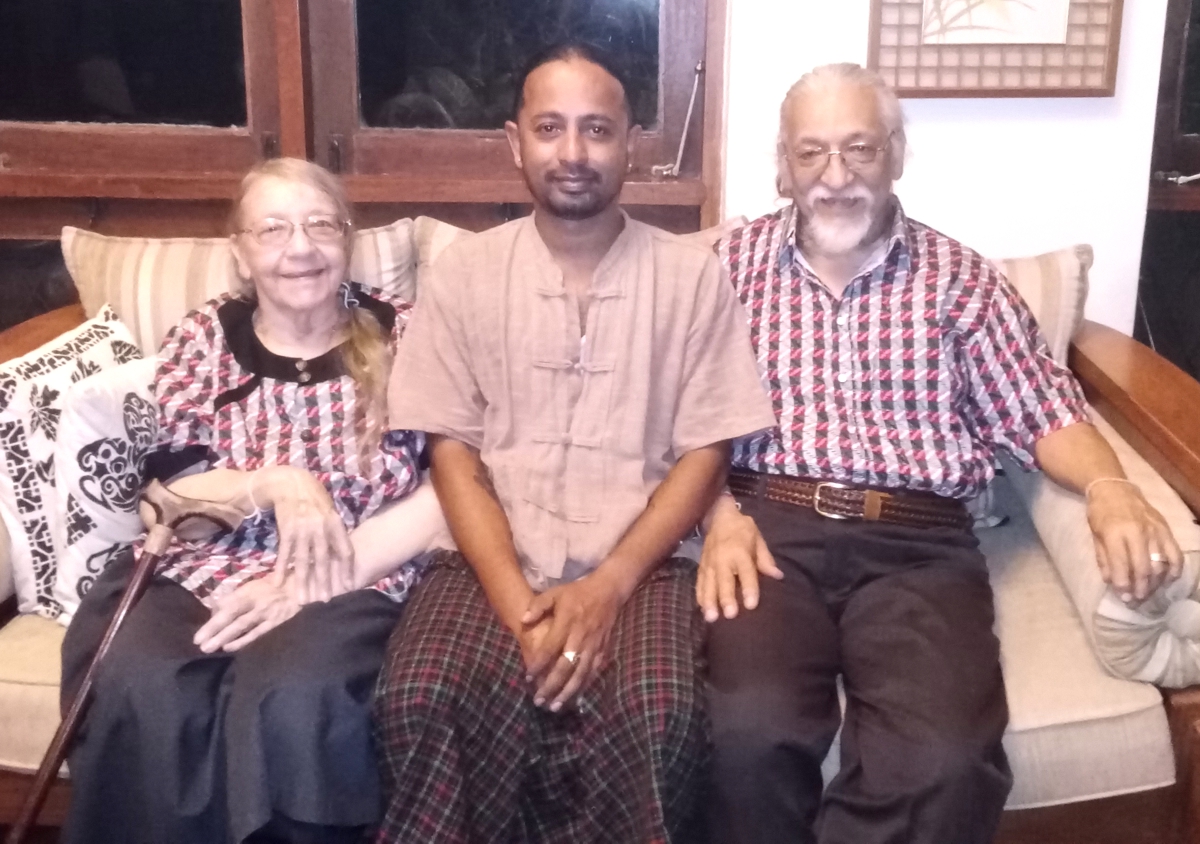 In April, Rajiv made another short visit from Kolkata. It's always a joy to have him with us. He is like a son. (We know his mother will understand what we mean!) He always travels light, so he was able to bring a few things, readily available in India, but difficult to find or expensive here, for us, Lily, Menusha, and Ashoka. Next visit, we hope, will include Shilar and their daughter, Visakha, so that we can all make music together!
In April, Rajiv made another short visit from Kolkata. It's always a joy to have him with us. He is like a son. (We know his mother will understand what we mean!) He always travels light, so he was able to bring a few things, readily available in India, but difficult to find or expensive here, for us, Lily, Menusha, and Ashoka. Next visit, we hope, will include Shilar and their daughter, Visakha, so that we can all make music together!
Ken's nephew, Tracy, and his wife, Bonnie, arrived in Sri Lanka at the end of May and stayed for three months. Of course, that included July, which here, as everywhere else in the world was almost unbearably hot. Nevertheless, they had a good visit, and we truly enjoyed getting to know them better. They were impressed particularly by the plethora of fresh fruit they were able to eat every day--papaya, pineapple, passion fruit, mangoes, soursop, rambutan, mangosteen, at least ten kinds of bananas, and DURIAN, the king of fruit.
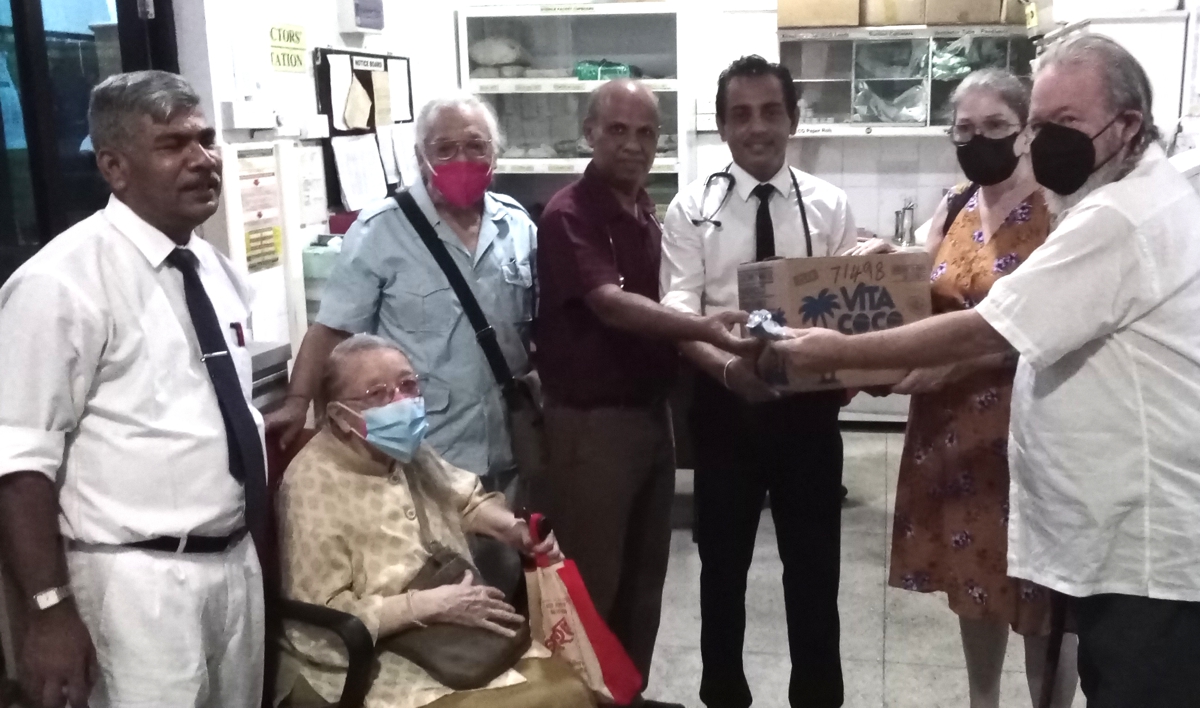 Before they came, they asked what relief supplies they might bring. We asked our local physician, Dr. Salahudeen, and he requested oxygen tank regulators and sent us a photo of the item. We found the exact model on Amazon and sent the product code to them. As quick as a cat could wink its eye, Bonnie ordered two. Shortly after Bonnie and Tracy arrived, we accompanied them to the Emergency Ward of Kandy Hospital to make the presentation. Without these small devices, oxygen tanks are useless! Sadhu! Sadhu!! Sadhu!!!
Before they came, they asked what relief supplies they might bring. We asked our local physician, Dr. Salahudeen, and he requested oxygen tank regulators and sent us a photo of the item. We found the exact model on Amazon and sent the product code to them. As quick as a cat could wink its eye, Bonnie ordered two. Shortly after Bonnie and Tracy arrived, we accompanied them to the Emergency Ward of Kandy Hospital to make the presentation. Without these small devices, oxygen tanks are useless! Sadhu! Sadhu!! Sadhu!!!
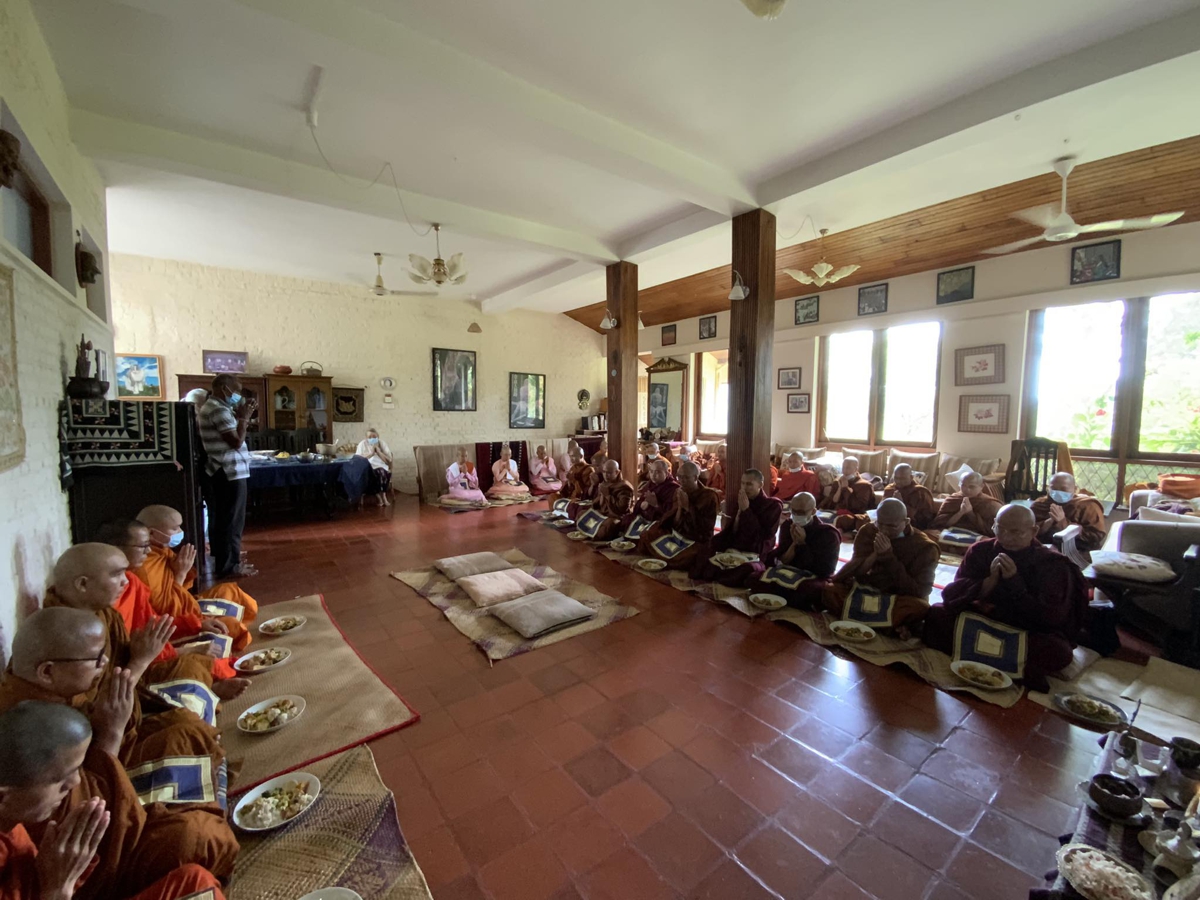 |
|
| Click the photo to see more photos and to read about the dana. | |
Although, with new flu and cold-like variants, there's every indication that Covid is not over, we feel comfortable in relaxing a bit and being more social than before, but we still use our masks.
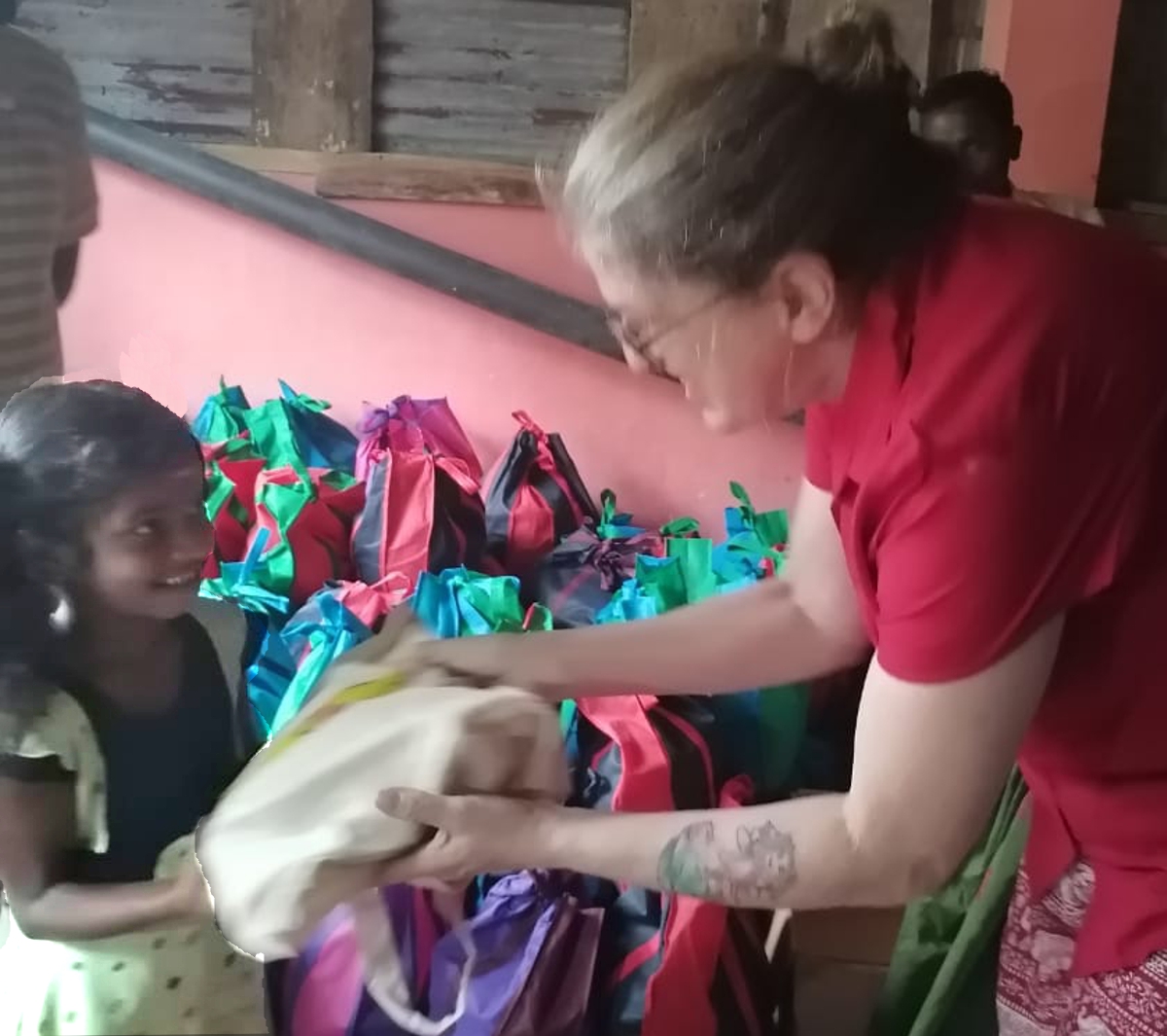 Bonnie went with Lily's family to distribute food parcels and school supplies to families and children in a remote village near Kandy. She also visited Tikiri Sevana Orphanage and Mother Teresa's Home for the Handicapped. In both institutions, she handed out gifts to mark our and Tracy's birthdays, and at Mother Teresa's she saw the need for seating cushions and art supplies. The residents must have felt a special bond, because they responded with hugs.
Bonnie went with Lily's family to distribute food parcels and school supplies to families and children in a remote village near Kandy. She also visited Tikiri Sevana Orphanage and Mother Teresa's Home for the Handicapped. In both institutions, she handed out gifts to mark our and Tracy's birthdays, and at Mother Teresa's she saw the need for seating cushions and art supplies. The residents must have felt a special bond, because they responded with hugs.
Tracy didn't move around so much because he had developed an intestinal blockage, which required several days in hospital for tests and observation. For a few weeks, he was quite uncomfortable, but he was satisfied with the treatment he received and the skill and competence of the doctors. Moreover, the bill for all services at the best private hospital in Kandy was much less than it would have been in the United States. For a while he kept to a liquid diet, which Lily's easily prepared, and felt fit enough for the long trip back to Ohio, which was accomplished without a hitch.
We do recommend, to be on the safe side, that any friends who come for a holiday purchase travel health insurance in case of any problem.
When we happened to mention that our dentist here is, perhaps, the best in the world, Bonnietold us that she needed implants for her back teeth, and that she did not have dental insurance to cover the procedure at home. We immediately made an appointment for her, and she was able to get exactly what she wanted at one tenth of the American cost. Dr. Sajeewa worked diligently and carefully, scheduling her visits once a week for most of the three months, the last being just two days before they left Kandy. Kudos to her for being able to take all that surgery in such a short time and still travel around Central Province, getting a feel for the place!
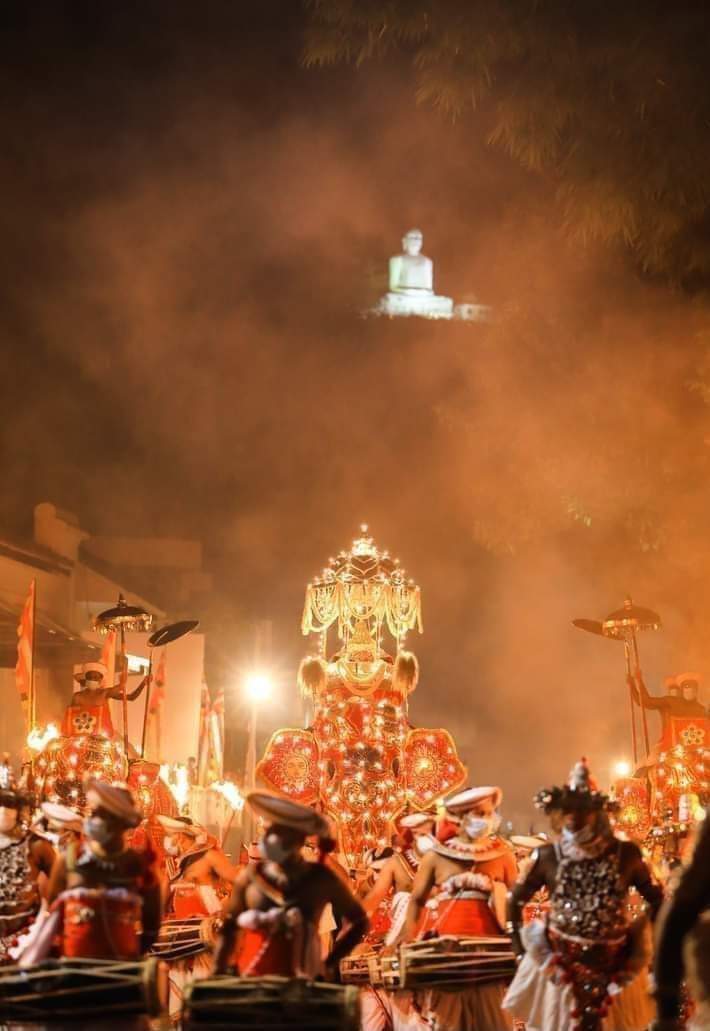 |
|
| This photo was sent to us. Click it to see some of our photos of this year's Perahera. | |
One further note--Tracy and Bonnie found Sri Lanka so agreeable that they are thinking to come back in about two years and to make this their retirement home, a base from which they will be able to travel around Asia. Delightful!
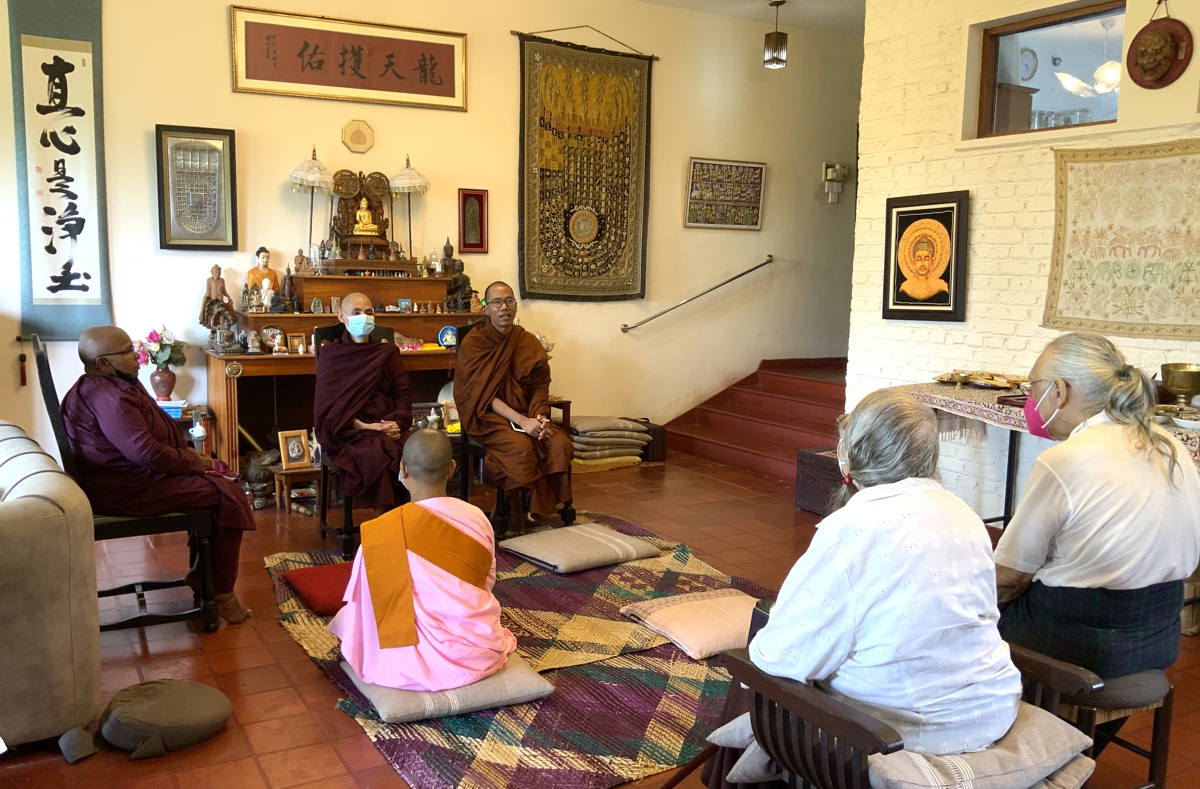 |
|
| Click the photo to see more photos of the dana. | |
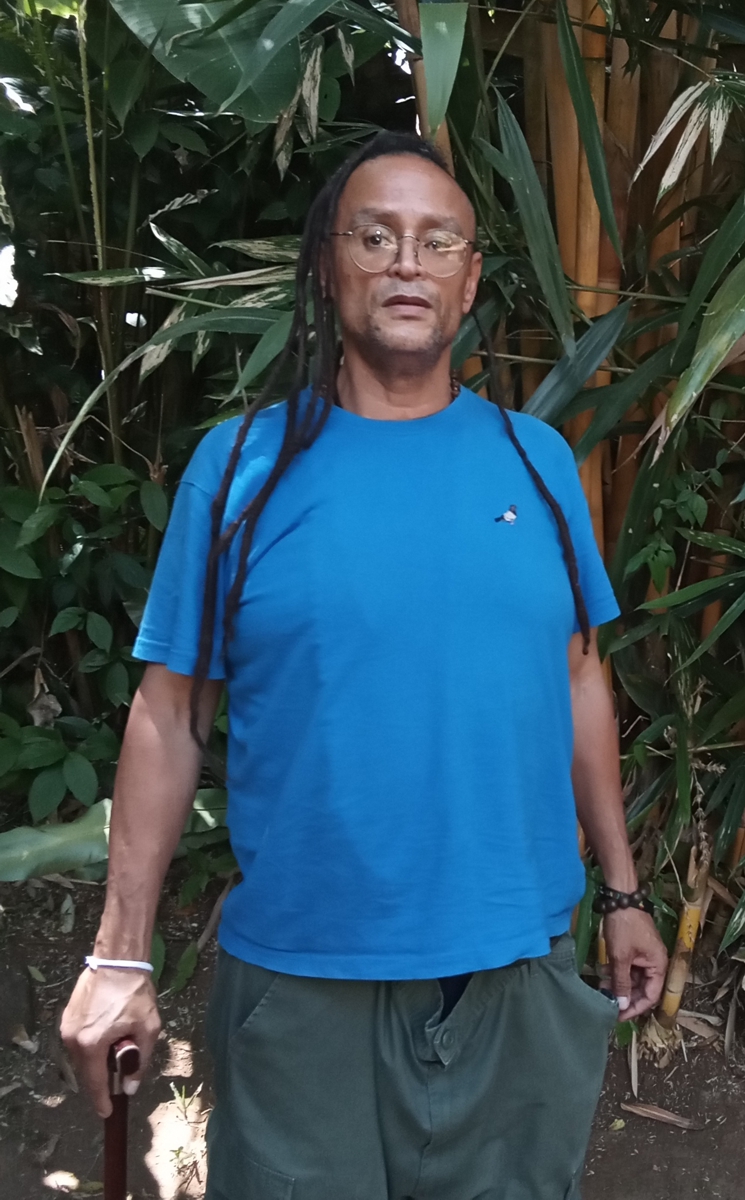 Pedro spent one morning with Ewen at the Royal Botanical Gardens in Peradeniya (which rival Kew Gardens in London) and, on another, hiked on his own into Kandy to visit the Temple of the Tooth. The highlight of his stay, however, was the evening we spent at the Perahera. We had the perfect seats to enjoy the dancers, the musicians, and the beautifully caparisoned elephants. They were so close we could almost touch them.
Pedro spent one morning with Ewen at the Royal Botanical Gardens in Peradeniya (which rival Kew Gardens in London) and, on another, hiked on his own into Kandy to visit the Temple of the Tooth. The highlight of his stay, however, was the evening we spent at the Perahera. We had the perfect seats to enjoy the dancers, the musicians, and the beautifully caparisoned elephants. They were so close we could almost touch them.
Pedro also had a medical issue, a diabetic ulcer that had been infected for several months and had not really responded to the treatment he had received in New York. We took him to see Dr. Salahudeen, who prescribed several antibiotics and asked him to return every other day for cleaning and observation. There was a definite improvement, and he was able to get enough antibiotics to continue the treatment at home. The doctor's bill was about ten dollars, and the medicine was about another ten! All praise for our wonderful local physicians who stay and serve our community!
We wake up each day and feel gratitude for whatever good we did in the past to give us human birth in this (still) beautiful world. We live in an amazing place, and we have more than we need. We are blessed with wonderful friends, and because it seems that our traveling days are pretty much over, we are happy that so many of you can visit us. We offer hospitality to all who can come. (We look forward to Paul's visit from New Zealand next month.) Even if you can't come to Sri Lanka, we are always glad to hear from you, and we are grateful that the internet makes communication so easy.
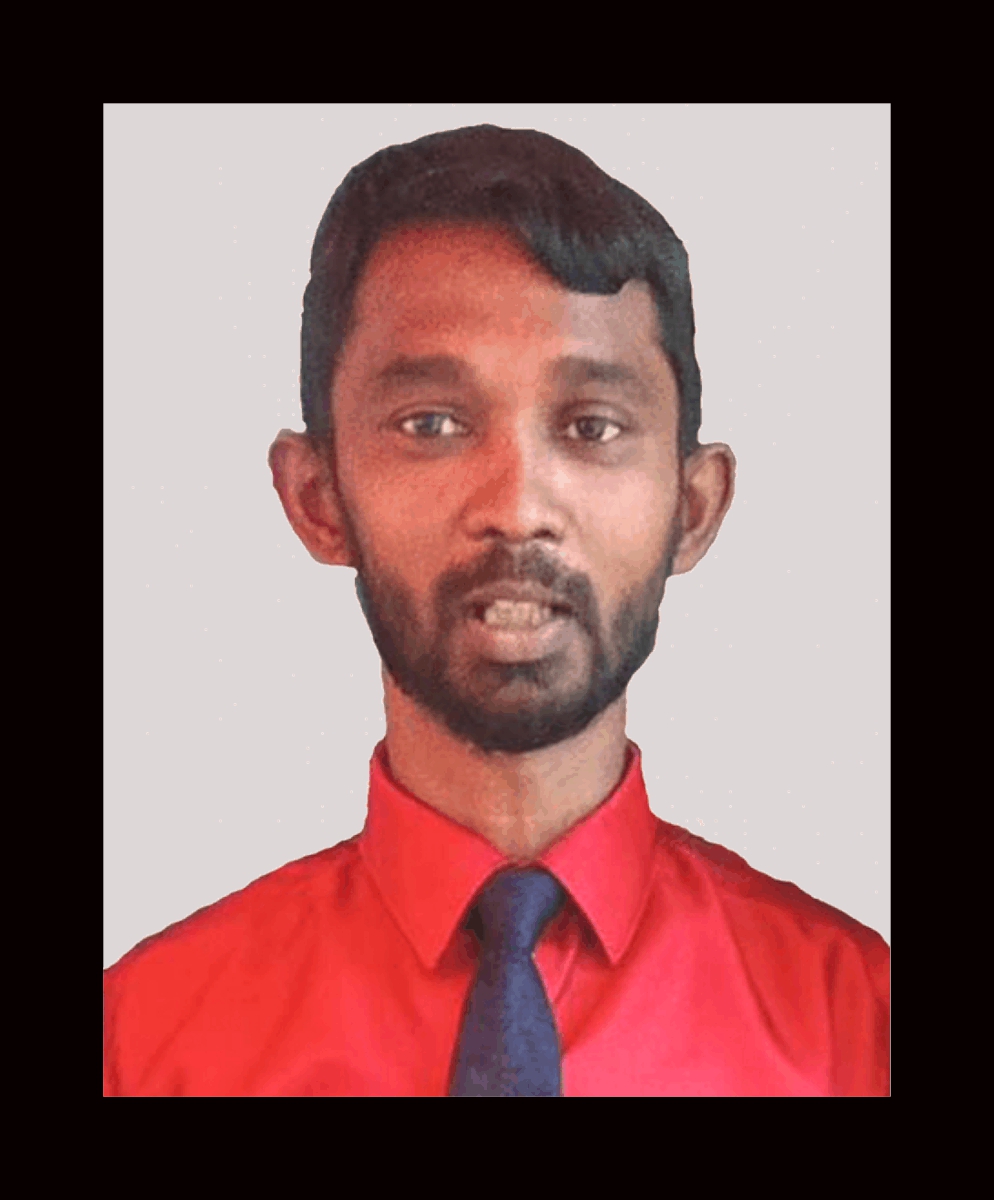 We are sad to report that Sashi Kumar, an affable, popular three-wheeler driver in Anniwatte, passed away recently. He had been suffering from kidney failure, caused mainly by severe diabetes. He is survived by his wife and three children. The oldest son has relocated to Colombo, where he is serving as an apprentice to help support his family. In cooperation with their church community, we want to protect this vulnerable family in these difficult times.
We are sad to report that Sashi Kumar, an affable, popular three-wheeler driver in Anniwatte, passed away recently. He had been suffering from kidney failure, caused mainly by severe diabetes. He is survived by his wife and three children. The oldest son has relocated to Colombo, where he is serving as an apprentice to help support his family. In cooperation with their church community, we want to protect this vulnerable family in these difficult times.
 We had not expected any birthday presents, but Lal and Vivi surprised us on both occasions by sending lovely flower arrangements. Of course, we placed them in front of the altar, and left them long enough to contemplate annica (impermanence) as they wilted. and decayed.
We had not expected any birthday presents, but Lal and Vivi surprised us on both occasions by sending lovely flower arrangements. Of course, we placed them in front of the altar, and left them long enough to contemplate annica (impermanence) as they wilted. and decayed.
On September 10, Lily and her family delivered food parcels for one hundred families and school supplies for thirty children in Ragala, a village beyond Nuwara Eliya. Their van, driven by Lily's grandson, Shehan, followed the truck over the rough road leading through the hills. Although the trek took longer than expected, the villagers were waiting patiently and warmly greeted their arrival. The distribution took place after a brief ceremony at the local school.